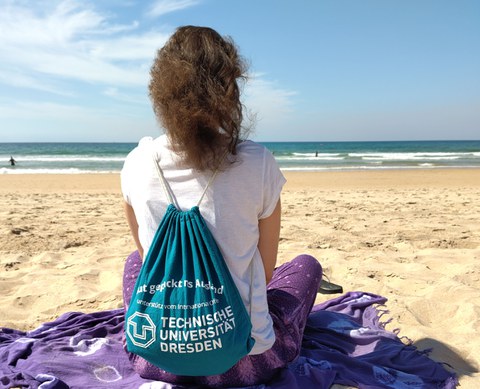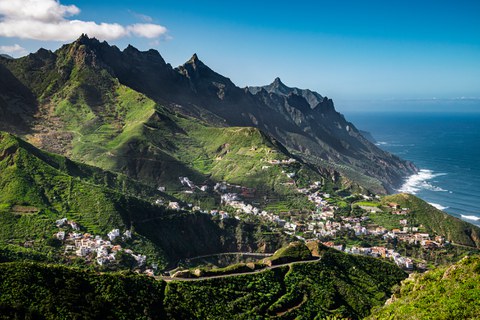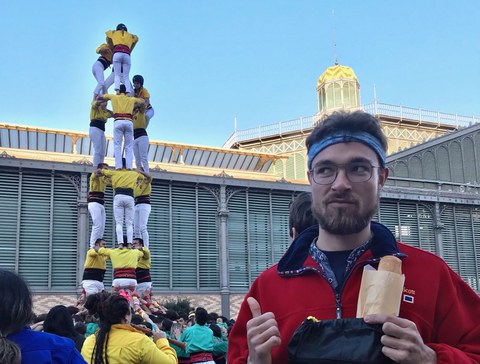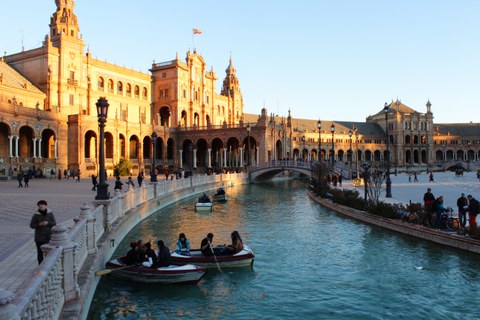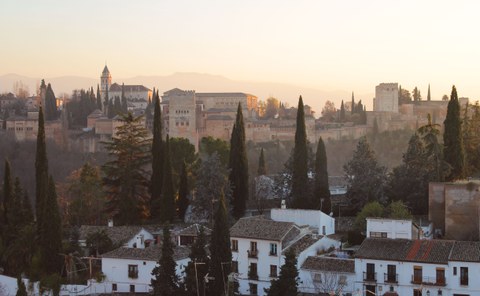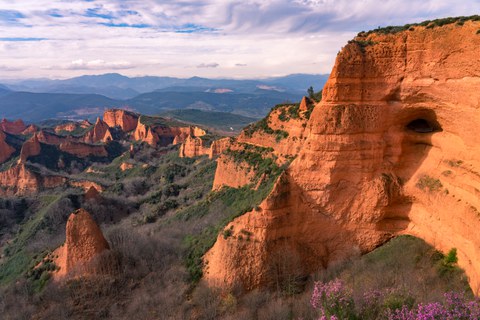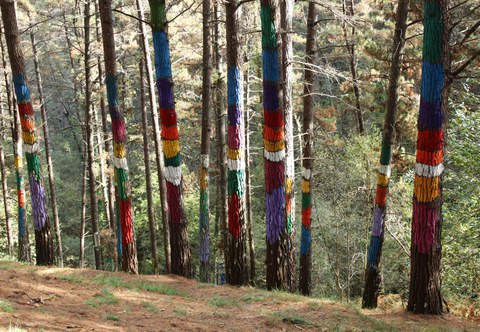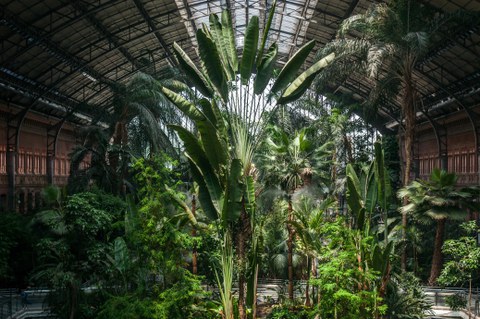Partnerland des Monats: Spanien
Neben Palmen, Strand und Sonne hat Spanien noch viel mehr zu bieten: warme, herzliche Menschen, eine große regionale Vielfalt in Landschaft und Kultur, und natürlich die TUD- Partnerhochschulen. Unsere Kooperationen sind im ganzen Land verteilt, daher kannst du im Auslandssemester vom Großstadttrubel in Madrid oder Barcelona bis hin zur schroffen Schönheit der kanarischen Inseln alles erleben. Lass dich inspirieren bei einer Entdeckungsreise ins Land der Kaninchen und Planetensandwiches!
Mit der Aktion "Partnerland des Monats" richten wir den Scheinwerfer auf die große Vielfalt der Länder, Regionen und Partneruniversitäten der TU Dresden, in denen unsere Studierenden ein Auslandssemester verbringen können.
Inhaltsverzeichnis
Allgemeine Zahlen und Fakten zu Spanien
Hauptstadt: Madrid
Einwohner: 49,4 Mio. (2025)
Amtssprache: Spanisch, sowie Regionalsprachen wie z.B. Katalanisch und Baskisch
Nationalfeiertag: Fiesta Nacional am 12. Oktober (Landung von Columbus in Amerika)
Währung: Euro
Weitere Zahlen, Fakten und Infos findet ihr natürlich auf Wikipedia, beim Deutschen Akademischen Austauschdienst (DAAD), oder auf den Seiten des Auswärtigen Amts. Touristische Infos gibt es z.B. bei wikivoyage oder spain.info.
Kleiner Sprachexkurs
- Hallo – Hola
- Guten Tag – ¡Buenos días!
- Wie geht’s? – ¿Qué tal? / ¿Cómo estás?
- Ich heiße … – Me llamo …
- Schön, dich kennenzulernen – Encantado/a
- Danke – Gracias
- Bis später – Hasta luego
Spanisch ist bei weitem nicht die einzige Sprache Spaniens, auch wenn es von 99% der Bevölkerung beherrscht wird. Um es von den anderen einheimischen Sprachen zu unterscheiden, wird Spanisch oft nach seiner Heimatregion Kastilien castellano genannt. Die größten Regionalsprachen sind Katalanisch/Valencianisch entlang der Ostküste, das eng mit Portugiesisch verwandte Galicisch im Nordwesten sowie Baskisch im Nordosten. Diese Sprachen sind oft wichtiger Teil einer regionalen Identität.
Spanisch zählt zu den meistgesprochenen Sprachen der Welt. Durch seine Verbreitung von Spanien über Lateinamerika vor mehreren Jahrhunderten gibt es heute viele regionale Besonderheiten. Auffällig am spanischen Spanisch ist beispielsweise die Aussprache von c / z ähnlich dem englischen th (statt als s). Umgangssprachliche Wendungen sowie Begriffe für Essen und Alltagsgegenstände unterscheiden sich oft von Land zu Land, aber größere Verständigungsprobleme sind unwahrscheinlich.
Unsere Partneruniversitäten bieten meist Kurse auf Spanisch und Englisch an. Je nach Universität und Kurswahl kannst du also auf Spanisch, gemischt oder auch komplett auf Englisch studieren und brauchst entsprechend verschiedene Sprachnachweise. Schau bitte vor deiner Bewerbung, was genau die jeweiligen Voraussetzungen an deiner Wunschuni sind.
Spanisch lernen ist vergleichsweise einfach und wird dir sehr dabei helfen, tiefer in die spanische Kultur einzutauchen. Auch aufgrund der großen internationalen Reichweite schaden Spanischkenntnisse auf keinen Fall. TUDIAS bietet Spanischkurse in Dresden an, vom Anfänger:innen-Niveau bis zum fortgeschrittenen Spanisch-Profilkurs speziell zur Vorbereitung für Auslandsaufenthalte. Auch ein Englisch-Kurs zur Vorbereitung von Auslandsaufenthalten ist verfügbar.
Wusstest Du schon, dass ....?
- die Bewohner:innen der kanarischen Insel La Gomera pfeifend Gespräche führen können? Der sogenannte silbo gomero ist wie ein Code, um Sprache in Pfiffe zu übertragen. Die Pfeifgespräche können über Entfernungen von bis zu drei Kilometern hinweg geführt werden, was im bergigen, zerklüfteten Gelände von La Gomera äußerst praktisch war. Heutzutage ist das Pfeifen Pflichtfach an den Schulen von La Gomera, um das kulturelle Erbe zu erhalten – und manchmal dient es auch als musikalische Inspiration.
- Spanien „Land der vielen Kaninchen“ bedeuten könnte? Das ist eine Interpretation des antiken phönizischen Namens i-sphan-im, von dem der heutige Landesname abstammt. Passend dazu zeigen römische Münzen Hispania (die Verkörperung Spaniens als Frauenfigur) zusammen mit einem Kaninchen. Kein Wunder, denn die iberische Halbinsel ist die ursprüngliche Heimat des europäischen Kaninchens. Es spielt hier als Nahrungsgrundlage zahlreicher Raubtiere eine wichtige Rolle im Ökosystem.
- Spanien und Frankreich gewissermaßen geteiltes Sorgerecht über eine kleine Insel haben? Die Fasaneninsel liegt im Grenzfluss Bidasoa, der die beiden Länder an der Atlantikküste teilt. Jeweils von Februar bis Juli gehört sie zu Spanien und von August bis Januar zu Frankreich, mit halbjährlichen Übergabezeremonien. Früher diente die Insel oft als neutraler Ort für Zusammenkünfte der Königshäuser.
- Barcelona Vorreiter der nachhaltigen Stadtentwicklung ist? Seit 2017 werden hier jeweils neun Häuserblocks zu einem Superblock zusammengefasst, innerhalb dessen der Autoverkehr reduziert wird. Straßenfläche wird in Fußgänger- und Fahrradzonen umgewandelt. So entsteht Platz für Sitzareale, Spielplätze, Hochbeete, Begrünung und vieles mehr. Die Lebensqualität und auch die Anzahl lokaler Geschäfte sind seitdem angestiegen, und Barcelona inspirierte mit dem Konzept Städte weltweit.
-
das Bauen menschlicher Türme, sogenannter castells, ein typisch katalanischer Sport ist? Neun oder zehn „Stockwerke“ sind dabei nicht ungewöhnlich. Der Körperbau entscheidet über die Position im Turm – schwerere und kräftigere Personen bilden die unteren Ebenen, leichtere und kleinere kommen weiter nach oben, und Kinder klettern bis zur Spitze. Castells sind absolutes Teamwork und werden von einer breiten Basis gestützt. Diese sogenannte pinya steht in Katalonien auch sprichwörtlich für solidarische Zusammenarbeit.
-
Spanien einer der wenigen Orte ist, an denen unser Planet als Sandwich zubereitet werden kann? Die iberische Halbinsel ist die einzige Region Europas, auf deren gegenüberliegender Erdseite sich mit Neuseeland eine größere Landmasse befindet. Bisher ist es zwei Mal vorgekommen, dass sich Menschen in Spanien und Neuseeland zusammengefunden haben, um Brot an genau gegenüberliegenden Koordinaten zu platzieren – und fertig ist das Erd-Sandwich.
-
das spanische Organspende-System als weltweites Vorbild gilt? Schon seit Jahren werden in Spanien besonders viele Transplantationen durchgeführt, mit der weltweit höchsten Spenderate für Totspenden. Grund hierfür ist nicht nur das in Spanien geltende Opt-out-System – jede:r ist Organspender:in, solange kein Widerspruch vorliegt – sondern auch viel Vertrauen ins System, das durch transparent organisierte Strukturen in einem soliden rechtlichen Rahmen sowie viel Öffentlichkeitsarbeit und Unterstützung für die Familien von Spender:innen entsteht.
- in Spanien zwölf Weintrauben Glück fürs neue Jahr bringen? Um Mitternacht wird auf dem Platz Puerta del Sol in Madrid das neue Jahr mit zwölf Glockenschlägen eingeläutet – landesweit im Fernsehen übertragen. Wem es gelingt, auf jeden der im Abstand von drei Sekunden folgenden Glockenschläge eine Weintraube zu essen, der kann mit Glück im neuen Jahr rechnen.
Kooperationen mit Universitäten in Spanien
Spanien ist einer unserer wichtigsten Kooperationspartner. Aktuell hat die TUD Austauschvereinbarungen mit 38 Universitäten in Spanien, die im ganzen Land verteilt liegen – sogar auf den kanarischen Inseln und auf Mallorca sind wir vertreten. Dabei stehen insgesamt 29 verschiedene Studienfächer zur Auswahl. Die Chancen stehen also gut, dass auch für dein Studienfach eine Kooperation besteht.
Alle Kooperationen findest du bei Mobility Online. Dort kannst du auch in den Erfahrungsberichten bisheriger Austauschstudierender stöbern. Es lohnt sich außerdem oft, in der eigenen Fakultät Professor:innen zu fragen, die direkte Kontakte zur gewünschten Partneruni haben.
Informiere dich über Erasmus+ an der TU Dresden sowie die Ansprechpartner:innen und Bewerbungsfristen für deine Fakultät. Alle unsere Kooperationen mit spanischen Universitäten sind über Erasmus+ organisiert.
Don't miss...
Die Alhambra in Granada ist das wohl bedeutendste Bauwerk aus al-Andalus, der maurischen Zeit, als Teile Spaniens unter muslimischer Herrschaft standen (711 – 1492). Die Kombination aus Stadtburg, Palästen und prachtvollen Gärten voller Wasserläufe ist nach der Vision eines irdischen Paradieses gestaltet. Herzstück sind die Nasridenpaläste, ehemaliger Sitz der Emire von Granada. Die Palasträume sind prächtig dekoriert mit Stalaktitengewölben, farbigen Fliesen und feinster ornamentaler Steinhauerei. Der Besuch wird über Zeitslots eingeschränkt, also unbedingt vorbuchen. Fun Fact: Al-Andalus hinterließ Spanien nicht nur Bauwerke, sondern auch viele arabischstämmige Wörter.
Las Médulas. Die malerische Landschaft voll zerklüfteter rötlicher Felsen nahe unserer Partnerstadt León ist tatsächlich das Ergebnis römischen Bergbaus. Früher lag hier die wichtigste Goldmine des Römischen Reichs, erschlossen durch ruina montium (Berge zerstören). Dabei wurden ganze Berge durchlöchert, mit großen Wassermengen überschwemmt und so wortwörtlich zerstört. Seitdem hat sich die Natur das Gebiet zurückerobert. Du kannst bei einer Höhlenführung mehr erfahren und auf Wanderwegen durch dichte Kastanienwälder zu den schönsten Aussichtspunkten gelangen.
Im Bosque de Oma nahe unserer Partnerstadt Bilbao kannst du auf einer Wanderung ein außergewöhnliches Kunstwerk erkunden. Der baskische Künstler Agustín Ibarrola nutzte die Natur als seine Leinwand und bemalte hunderte Bäume mit farbenfrohen Motiven, von menschlichen Figuren über tierische Gestalten bis zu geometrischen Objekten. Die Gesamtbilder zu entdecken ist ein kleines Abenteuer, denn du musst dabei die richtige Perspektive finden. Hier kannst du deinen Besuch kostenlos anmelden.
Fiesta de Gràcia in Barcelona. Im August wetteifern die Bewohner:innen im Viertel Gràcia um die bestdekorierte Straße, was ein farbenfrohes Chaos mit Mottos von Römischem Ringen bis Unterwasserwelt ergibt. Konzerte, Shows und Streetfood sowie die typisch katalanischen Castells und Correfocs (Feuerrennen) komplettieren das ausgelassene Bild. Natürlich ist Barcelona das ganze Jahr über einen Besuch wert. Nicht verpassen solltest du die verspielte Architektur von Antoni Gaudí – darunter prächtige Villen und die farbenfrohen Mosaiken des Parque Güell. Highlight ist die Kathedrale Sagrada Familia, ein so monumentales Werk, dass ihr Bau nach 144 Jahren immer noch unvollendet ist. Im Sonnenlicht tauchen die Fenster das Innere in Regenbogenfarben.
Madrids Museen. Wer aus einer unser anderen Partnerstädte in Madrid ankommt, landet wahrscheinlich erstmal im Bahnhof Atocha. Schon der hat es in sich – ein beeindruckender botanischer Garten mit 7.000 tropischen Pflanzen füllt eine der Bahnhofshallen. In der Stadt selbst solltest du die Museen nicht verpassen, die nicht nur mit tollen Ausstellungen, sondern auch mit kostenlosem Studi-Eintritt aufwarten. Sehr empfehlenswert sind das Museo de América, das die spanische Kolonialgeschichte und viele amerikanische Zivilisationen beleuchtet, das Museo Arqueológico Nacional mit seiner alt-iberischen Statuensammlung, und natürlich das Museo del Prado, eines der bedeutendsten Kunstmuseen weltweit.
Lasst uns kochen...
Das Wahrzeichen der spanischen Esskultur sind natürlich Tapas. Diese Appetithäppchen werden als Zugabe zu einem Getränk serviert und dienten wohl ursprünglich als Deckel. Tapas gibt es in einer riesigen Vielfalt mit zahllosen lokalen Spezialitäten. Klassiker sind z.B. Tortilla, Oliven, Schinken, Patatas Bravas (Kartoffeln mit würziger Sauce), Käse oder Kroketten. Üblicherweise zieht man in der Gruppe von Bar zu Bar und teilt die Tapas miteinander. Wenn man danach noch Feiern geht und am Ende ein Frühstück braucht, landet man (vor allem in Madrid) wahrscheinlich bei Chocolate con Churros.
In Spanien wird oft deutlich später gegessen als in Mitteleuropa. So gibt es meist gegen 14 Uhr Mittagessen, einen Snack (merienda) gegen 18 Uhr, und das Abendessen ab 21 Uhr. Neben der sommerlichen Tageshitze liegen die Nachteulen-freundlichen Zeiten auch daran, dass Spanien die „falsche“ Zeitzone verwendet. Nach den Mahlzeiten bleibt man üblicherweise noch länger am Tisch und genießt die Gespräche der sobremesa.
Aus der spanischen Küche nicht wegzudenken ist das Olivenöl. Es wird nicht nur zum Braten und Träufeln verwendet, sondern bildet auch die Basis vieler Saucen und kommt statt der Butter aufs Brot. Weitere typisch spanische Zutaten sind z.B. Knoblauch, Paprika als Gewürz und als Gemüse, Hülsenfrüchte, und an den Küsten Fisch und Meeresfrüchte.
Unser Rezeptvorschlag: Ajoblanco Malagueño
Ajoblanco ist der weniger bekannte, ursprünglichere Cousin von Gazpacho. Beide sind kalte Suppen der andalusischen Küche, perfekt für heiße südspanische Sommer. Während für Gazpacho rohes Gemüse püriert wird, basiert Ajoblanco auf gemahlenen Mandeln und Weißbrot, regionaltypisch gewürzt mit Knoblauch und Olivenöl. Die Verwendung der Mandeln lässt vermuten, dass das Gericht auf die Zeit des maurisches al-Andalus zurückzuführen ist. Weintrauben oder Honigmelonenstücke bilden einen süßen Kontrast.
Ajoblanco ist so beliebt, dass er sogar ein eigenes Festival hat – bei der Fiesta del Ajoblanco in Almáchar werden jedes Jahr bei Musik und Tanz tausende Liter Suppe ausgeschenkt. Lust auf einen Vorgeschmack?
Kontakt und weitere Ansprechpersonen
Hattest du eine tolle Zeit in Spanien? Hast du Tipps für Orte und Erlebnisse, die man nicht missen sollte? Gern teilen wir auch deine Erfahrungen – hier, über Social Media oder auch, wenn du Lust hast, bei Infoveranstaltungen mit anderen TUD-Studierenden. Melde dich bei uns:
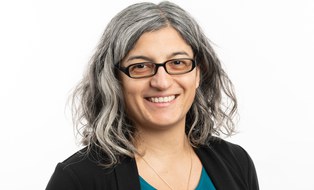 © Sven Ellger/TUD
© Sven Ellger/TUD
Beratung zum Studium im Ausland
NameFrau Federica Serra
Infocenter / TUD weltweit: Amerika, Australien und UK / PROMOS
Eine verschlüsselte E-Mail über das SecureMail-Portal versenden (nur für TUD-externe Personen).
Besuchsadresse:
Fritz Foerster Bau, Büro 156 Mommsenstraße 6
01069 Dresden
Postadresse:
Technische Universität Dresden International Office
01062 Dresden
Sprechzeiten:
- Dienstag:
- 09:30 - 11:30
- 12:30 - 14:30
- Donnerstag:
- 09:30 - 11:30
Bitte im SCS (FOE UG) anmelden.
Du möchtest dich aus erster Hand informieren?
Du willst mehr über Spanien erfahren? Frag die Alumnibotschafter:innen der TU Dresden, die in vielen Ländern der Welt aktiv sind. Sie geben dir gerne Tipps und Hinweise für deinen Aufenthalt.
Kontaktieren ist ganz einfach: Auf der interaktiven Weltkarte zeigen Markierungspunkte die Städte an, in denen die Alumnibotschafter:innen leben. Zu jeder Person ist ein Kurzprofil mit Kontaktinformationen hinterlegt.
Partnerländer Archiv
Hast du ein Partnerland verpasst? Kein Problem! Hier sammeln wir alle Seiten für dich zum Nachlesen.
|
Europa (Erasmus+) |
|
|
Afrika |
|
|
Amerika |
|
|
Asien |
|
|
Australien und Ozeanien |
|

